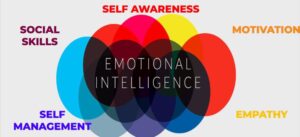The Role Of Emotion In Peak Performance And How To Regulate It

“Emotions are the fuel that powers peak performance.” – Hal Elrod.
The quote of Hal Elrod on emotions fully resonates with me. I truly believe that emotions are a powerful tool that can be harnessed to fuel peak performance. After the elections and the change of the government I was transferred from my position as ADGP L&O to ADGP Armed Police.This belief was put to the test when I was unexpectedly transferred again after I had only spent less than a year as ADGP AP and posted as the ADGP Idol Wing. I felt insulted and punished for no apparent reason. However, instead of dwelling on my negative emotions, I decided to channel them positively towards my new assignment.
I knew that the Idol Wing had a reputation for not being very successful in recovering stolen artifacts, and I was determined to change that. I turned my anger and frustration into a motivation to excel in my new position. I made the decision to give it my all and make the Idol Wing one of the best performing units in the state.
I focused on the task at hand and set clear goals for myself and the Wing. I wanted to recover as many stolen artifacts as possible and bring in innovative measures that had not been implemented before. I believed that my positive attitude and determination would rub off on my team, and we would all work together to achieve our goals.
Despite the initial frustration, with determination and hard work, we achieved a record of retrieving 10 stolen antique idols from countries like the USA and Australia. In addition, we registered the highest number of cases (81) and arrested 56 accused while recovering 298 idols – a feat that had never been accomplished in the history of the Idol Wing or anywhere in India. I am proud to say that we were able to achieve these milestones because of the positive emotions that we channeled towards our work.

As we continued to work, I brought in several innovative measures, such as launching a virtual museum, introducing blockchain technology, and introducing NFTs and Soulbound Tokens as a reward for the staff of the Idol Wing for doing good work. With my team’s hard work and dedication, we uploaded 3D images of the idols to the virtual museum to help the connoisseurs of art and culture and the general public view and appreciate the ancient cultural treasures of Tamil Nadu.
The Virtual Museum was a collection of digital Virtual Reality / Augmented Reality images, of stolen antique idols recovered by the team which the viewers could access through the tnidols.com website. One of the most significant benefits of virtual museums is that visitors can immerse themselves in the uploaded antique idols in the virtual museum regardless of location and geographical boundaries. Eventually, my team and I envisioned curating and transforming the virtual museum into a Metaverse of tomorrow where visitors could interact in 3D Cyberspace and have the experience of visiting a museum in physical space, with separate galleries having exhibits for different categories bringing on a total experience of the Metaverse.

Additionally, we launched an initiative that was the first of its kind in the state and country of receiving information from informants and enablinging our staff to submit grievances on the Block Chain. The public could also launch complaints on the Blockchain. Using the Blockchain’s immutable nature, the Idol Wing now had an efficient and secure way to track and store data, providing a digital trail, and allowing for easier identification of any issues or concerns regarding the handling of complaints. Overall, using the Blockchain by Idol Wing would help create a more reliable and secure system for tracking and resolving complaints. These initiatives helped to motivate my team and fostered a sense of pride in their work.
My experience in Idol Wing clearly reveals how emotions can be powerful tools for achieving peak performance. By channeling my negative emotions positively towards my new assignment, I was able to achieve mind-boggling work in the Wing, which was never before achieved in the history of the Tamilnadu Police. My experience perfectly captures the essence of Hal Elrod’s quote about how emotions can be harnessed to achieve peak performance.
Emotions, therefore, play a crucial role in our lives, affecting our thoughts, behaviours, and physiological responses. Emotions can be positive, such as happiness, excitement, and enthusiasm, or negative, such as anger, fear, and anxiety. In the context of performance, emotions can either enhance or impair performance. Emotions can be powerful motivators, energizing performers to achieve their goals. However, emotions can also be distracting and overwhelming, hindering performance. Here, we will discuss the role of emotions in performance and provide strategies for regulating emotions to optimize performance.
The Role of Emotions in Performance:
Emotions can have a significant impact on performance. Positive emotions such as happiness, joy, and excitement can enhance performance by improving motivation, increasing focus, and promoting creativity. For example, athletes who feel confident and excited before a competition may perform better than those who feel anxious or nervous. Similarly, musicians who feel joyful and passionate about their music may give a more inspired performance.
Negative emotions such as anxiety, fear, and anger can impair performance by causing distraction, reducing focus, and increasing physiological arousal. For example, a student who feels anxious about an upcoming exam may have difficulty concentrating and remembering information, leading to poor performance. Similarly, a public speaker who feels nervous and intimidated may stumble over their words and appear unconfident.
Emotional Intelligence and Self-Awareness:
To regulate emotions effectively, it is essential to develop emotional intelligence and self-awareness. Emotional intelligence is the ability to recognize and manage one’s emotions and the emotions of others. Self-awareness is the ability to recognize one’s own emotions, thoughts, and behaviors and understand how they affect oneself and others.

Developing emotional intelligence and self-awareness can help individuals regulate their emotions, leading to better performance. For example, a performer who is aware of their emotions and the impact they have on their performance can use strategies to regulate their emotions, such as deep breathing, visualization, or positive self-talk.
Strategies for Regulating Emotions:
There are several strategies that individuals can use to regulate their emotions and optimize performance. Strategies such as deep breathing, visualization, positive self talk, mindfulness, and exercise have been discussed in detail in other chapters of this book.
HARNESSING EMOTIONS FOR PEAK PERFORMANCE
Emotions can be powerful motivators that can help individuals achieve peak performance in various domains. Harnessing emotions for peak performance involves recognizing and managing one’s emotions to achieve optimal performance levels.

“Whiplash” (2014), directed by Damien Chazelle beautifully brings out how emotions can be harnessed for peak performance. The movie follows the story of a young jazz drummer named Andrew Neiman, played by Miles Teller, who dreams of becoming a great musician. Andrew enrolls in a prestigious music conservatory and catches the attention of Terence Fletcher, played by J.K. Simmons, a demanding and abusive music teacher who believes in pushing his students to their limits to achieve greatness.
Throughout the movie, emotions play a significant role in Andrew’s journey towards peak performance. At first, he struggles with anxiety and self-doubt, but as he becomes more confident in his abilities, he starts to channel his emotions into his drumming. When Fletcher pushes him to the brink of exhaustion and frustration, Andrew uses his anger and determination to fuel his performances.
The scene in which Andrew performs a solo during a music competition is a prime example of how emotions are used for peak performance. The tension and intensity build as Andrew’s drumming becomes faster and more complex, culminating in a breathtaking finale that leaves the audience and judges in awe. Andrew’s emotions drive him to push beyond his limits and deliver a performance that earns him the respect and admiration of his peers.
Overall, “Whiplash” illustrates how emotions can be harnessed for peak performance, but it also shows the darker side of this approach, including the toll it can take on one’s mental and physical health. The movie raises important questions about the relationship between emotions, perfectionism, and creativity, and how they can both drive and hinder success.
Strategies for harnessing emotions for peak performance.

Recognize and Label Emotions:
The first step in harnessing emotions for peak performance is to recognize and label them. Emotions are complex, and it can be challenging to identify them accurately. However, by recognizing and labeling emotions, individuals can gain greater self-awareness and manage their emotions more effectively. For example, an athlete who feels anxious before a competition can label their emotions as anxiety and use strategies to manage it, such as deep breathing or visualization.
Understand the Relationship between Emotions and Performance:
To harness emotions for peak performance, individuals must understand the relationship between emotions and performance. Emotions can either enhance or impair performance, depending on the situation. Positive emotions such as excitement, joy, and passion can enhance performance by increasing motivation, focus, and creativity. Negative emotions such as anxiety, fear, and anger can impair performance by causing distraction, reducing focus, and increasing physiological arousal. By understanding this relationship, individuals can use their emotions to achieve peak performance.
Use Emotions as Motivators:
Emotions can be powerful motivators that can help individuals achieve peak performance. By using emotions as motivators, individuals can channel their energy and focus towards achieving their goals. For example, an athlete who feels motivated and passionate about their sport can train harder and perform better during competitions.
Channel Emotions towards the Task at Hand:
To achieve peak performance, individuals must learn to channel their emotions towards the task at hand. This involves focusing on the present moment and using emotions to enhance performance. For example, a public speaker who feels nervous before a presentation can use their nervous energy to deliver an enthusiastic and engaging speech.
Develop Emotional Resilience:
Developing emotional resilience is crucial for harnessing emotions for peak performance. Emotional resilience involves the ability to adapt to and cope with stress, adversity, and setbacks. By developing emotional resilience, individuals can manage their emotions effectively and overcome obstacles that may hinder their performance. For example, a student who receives a poor grade on an exam can use their emotional resilience to bounce back and perform better on future exams.
Some great celebrities, who harnessed emotions for peak performance are Oprah Winfrey, a media mogul and philanthropist, known for her empathetic nature and emotional intelligence. She used her own struggles and experiences to connect with her audience and inspire them to overcome their own challenges. Winfrey’s ability to connect emotionally with her viewers made her one of the most influential and successful personalities in the entertainment industry. Similarly, Albert Einstein, the renowned physicist who developed the theory of relativity, was known for his creativity and intuition. He used his emotions to inspire his scientific discoveries, often relying on his “gut feeling” to guide his research. Einstein believed that emotions were a crucial part of the creative process and that they could help him see patterns and connections that others might miss.
Harnessing emotions for peak performance involves recognizing and labeling emotions, understanding the relationship between emotions and performance, using emotions as motivators, channeling emotions towards the task at hand, and developing emotional resilience. By incorporating these strategies into their daily routine, individuals can use their emotions to achieve peak performance in various domains of life.
Connection between emotional regulation and peak performance
Emotional regulation and peak performance are closely connected. Emotional regulation refers to the ability to recognize, understand, and manage one’s emotions effectively, while peak performance refers to achieving optimal levels of performance in a particular domain. In this section, we will discuss the connection between emotional regulation and peak performance.

Emotional Regulation Enhances Focus:
Emotional regulation can enhance focus, which is essential for achieving peak performance. By managing their emotions effectively, individuals can reduce distractions and concentrate on the task at hand. For example, an athlete who experiences anxiety before a competition can use emotional regulation techniques, such as deep breathing or positive self-talk, to calm their nerves and focus on their performance.
Emotional Regulation Reduces Stress:
Stress can hinder performance, making it difficult to achieve peak performance. Emotional regulation can reduce stress levels and promote a state of relaxation, allowing individuals to perform at their best. For example, a student who experiences stress before an exam can use emotional regulation techniques, such as mindfulness or visualization, to reduce their stress levels and perform better on the exam.
Emotional Regulation Improves Decision-Making:
Emotional regulation can improve decision-making, which is crucial for achieving peak performance. By managing their emotions effectively, individuals can make more rational and logical decisions. For example, a business executive who experiences anger during a negotiation can use emotional regulation techniques, such as taking a break or practicing empathy, to make more informed decisions.
Emotional Regulation Enhances Resilience:
Emotional regulation can enhance resilience, which is essential for achieving peak performance. By managing their emotions effectively, individuals can adapt to and cope with stress, setbacks, and obstacles that may hinder their performance. For example, an athlete who experiences a setback during training can use emotional regulation techniques, such as reframing or positive self-talk, to bounce back and perform at their best.
Emotional Regulation Promotes Positive Emotions:
Emotional regulation can promote positive emotions, such as joy, passion, and excitement, which can enhance performance and promote a sense of well-being. For example, a musician who experiences joy while performing can use emotional regulation techniques, such as mindfulness or visualization, to enhance their performance and promote a sense of fulfillment.
In conclusion, emotional regulation and peak performance are closely connected. Emotional regulation can enhance focus, reduce stress, improve decision-making, enhance resilience, and promote positive emotions, all of which are crucial for achieving peak performance. By incorporating emotional regulation techniques into their daily routine, individuals can manage their emotions effectively and achieve optimal levels of performance in various domains of life.
Importance of emotional intelligence for peak performance
Emotional intelligence is the ability to recognize, understand, and manage one’s own emotions, as well as the emotions of others. It is an important factor in achieving peak performance in any domain, including sports, business, and creative fields. Here are some reasons why emotional intelligence is essential for peak performance:

Self-awareness: Emotional intelligence helps individuals develop self-awareness, which is the foundation of peak performance. By understanding their own emotions, strengths, and weaknesses, individuals can identify areas for improvement and work to overcome challenges. Self-awareness also helps individuals set realistic goals and focus their efforts on achieving them.
Self-regulation: Emotionally intelligent individuals are able to regulate their emotions effectively, which is crucial for maintaining focus and staying calm under pressure. This skill helps individuals avoid becoming overwhelmed by stress or negative emotions and enables them to make rational decisions even in high-pressure situations.
Empathy: Emotional intelligence involves the ability to understand and connect with others’ emotions. This skill is essential for building strong relationships and collaborating effectively with others. Empathy helps individuals anticipate others’ needs and respond to them in a supportive and constructive manner.
Adaptability: Emotionally intelligent individuals are better equipped to adapt to changing circumstances and new challenges. They are more open to feedback and are able to adjust their approach based on the situation. This flexibility is crucial for achieving peak performance in dynamic environments.
Leadership: Emotional intelligence is a key component of effective leadership. Leaders who are emotionally intelligent are able to inspire and motivate their teams, build trust and loyalty, and create a positive and productive work environment. They are also able to handle conflicts and difficult conversations in a constructive manner.
Gandhi who practised emotional intelligence is widely regarded as one of the most influential figures in Indian history, known for his leadership in the Indian independence movement and his philosophy of nonviolent resistance. He was able to bring together diverse groups of people and unite them towards a common goal through his exceptional emotional intelligence.

Gandhi’s emotional intelligence helped him connect with people on a deeper level and understand their motivations, fears, and aspirations. He was able to communicate effectively with people from all walks of life, whether they were peasants, intellectuals, or political leaders. Gandhi’s ability to empathize with others helped him to build trust and credibility, which in turn enabled him to inspire and motivate people to take action towards their shared goals.
Additionally, Gandhi had a strong sense of self-awareness and was able to manage his emotions effectively. He was known for his calm and composed demeanor, even in the face of adversity. This enabled him to remain focused and resilient in the face of challenges, which was critical to his success in leading the Indian independence movement.
Overall, Gandhi’s emotional intelligence played a crucial role in his ability to achieve peak performance and lead India towards independence. His ability to connect with people, build trust, and manage his emotions effectively enabled him to inspire and mobilize millions of people towards a shared vision of a free and independent India.
Hence, Emotional intelligence is a crucial factor in achieving peak performance. By developing self-awareness, self-regulation, empathy, adaptability, and leadership skills, individuals can harness their emotions to drive success in any domain.
CONCLUSION
Emotions play a crucial role in performance. Positive emotions can enhance performance by increasing motivation, focus, and creativity, while negative emotions can impair performance by causing distraction, reducing focus, and increasing physiological arousal. To regulate emotions effectively, individuals must develop emotional intelligence and self-awareness, which involves recognizing and managing one’s emotions and the emotions of others.
There are several strategies that individuals can use to regulate their emotions and optimize performance, such as deep breathing, visualization, positive self-talk, mindfulness, and exercise. By incorporating these strategies into their daily routine, individuals can reduce stress, improve focus, and enhance performance.
In summary, emotions are an essential aspect of human life, and learning to regulate them is crucial for optimal performance in various areas of life. By developing emotional intelligence, self-awareness, and using effective strategies to regulate emotions, individuals can achieve their goals and lead a fulfilling life.
 Dr K. Jayanth Murali is a retired IPS officer and a Life Coach. He is the author of four books, including the best-selling 42 Mondays. He is passionate about painting, farming, and long-distance running. He has run several marathons and has two entries in the Asian book of Records in full and half marathon categories. He lives with his family in Chennai, India. When he is not running, he is either writing or chilling with a book.
Dr K. Jayanth Murali is a retired IPS officer and a Life Coach. He is the author of four books, including the best-selling 42 Mondays. He is passionate about painting, farming, and long-distance running. He has run several marathons and has two entries in the Asian book of Records in full and half marathon categories. He lives with his family in Chennai, India. When he is not running, he is either writing or chilling with a book.
